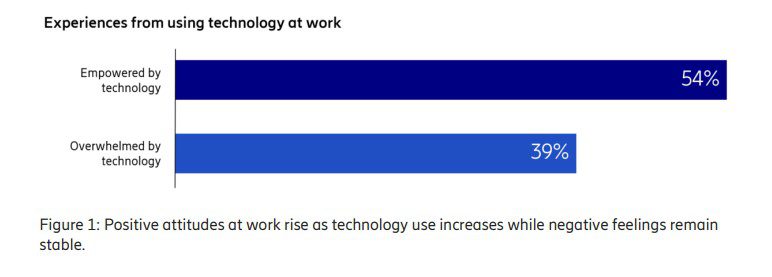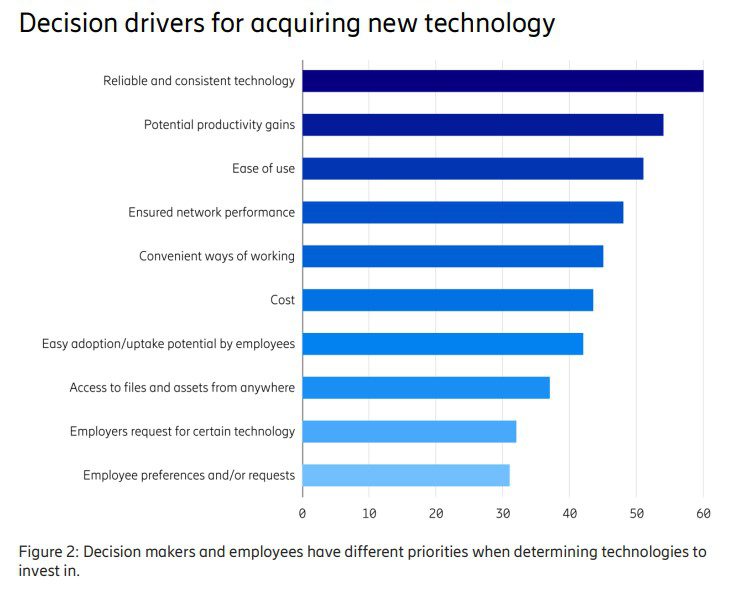Ericsson: Workers need better tech
Here’s how to overcome friction between employees and employers in the world of hybrid.
Why You Should Care
Flexible work is here to stay.
But to make it effective, employees need better tech tools, according to a global study by Ericsson.
Here's how to improve your digital employee experience.
HR leaders, don’t miss out: Join us in Las Vegas for free as a VIP guest at UNLEASH America.
The pandemic has changed the world of work forever.
Remote and flexible work are here to stay. In fact, workplace flexibility has become the new workplace currency and is now expected by employees in all industries across the world – this is according to Ericsson’s 2023 Future of Work Life report, which surveyed 38,000 workers in 30 markets.
The research found that workers are now much more interested in the doing of their work, rather than ‘going to work’ – what matters is the outcomes and results, not how many hours people put in at the office.
48% of employees say they were enjoying the increased flexibility at work, and 52% see flexible hours or location as key in the current and future of work.
Despite this, 36% are still struggling with their work-life balance and 33% worry that their work stress may increase in the future.
This is impacting their loyalty and inclination to stay at their current employer: 25% cited flexible working as a top priority when looking for a new job – this rose to 42% for flexible hours and 31% for location.
This is a major issue as 63% of decision makers – Ericsson surveyed 3,600 globally – predict retaining and attracting talent will only become more challenging the future.
Invest in the tech your employees need
A major reason why employees are struggling with current flexible working approach is because they do not have the right tech tools.
Just 20% of employees feel they have access to the right technology at work, while 40% are struggling with overlapping tools – these technologies were either too complex or had too many unnecessary features to drive productivity at work.
While many workers are feeling empowered by technology, a lot are actually struggling with technology overwhelm.

Credit: Ericsson, Future of Work Life report.
Although it is great news that 71% of decision makers are keen to continue to invest in workplace tech (over things like marketing and consulting), they may be wasting their money on the wrong tools.
Currently, only 33% are taking employee preferences into account when investing in new technology.

Credit: Ericsson, Future of Work Life report.
This misalignment between employers and employees on technology is creating huge friction –it is high time that decision makers change that narrative and talk to employees about their challenges and needs.
They also need to ensure employees have access to the right devices and internet connectivity to do their jobs effectively from remote locations.
The report stated: “Focusing on the digital employee experience rather than short term cost savings could result in long term wins, resolve conflicts between employers and employees, and lessen digital friction.
“As a result, efficiency would rise and reduce duplication related costs.”
Talking about the findings, Head of Ericsson Consumer Lab Jasmeet Singh Sethi commented: “There is a pressing need for organizations to invest in digital tools and robust connectivity that enable remote collaboration and flexibility, not only to attract and retain top talent, but also to stay competitive in the post-pandemic world.”
The International Festival of HR is back! Discover amazing speakers from the world of HR and business at UNLEASH America on 26-27 April 2023.
Sign up to the UNLEASH Newsletter
Get the Editor’s picks of the week delivered straight to your inbox!

Chief Reporter
Allie is an award-winning business journalist and can be reached at alexandra@unleash.ai.
-
Topics
Digital Adoption
HR Technology
